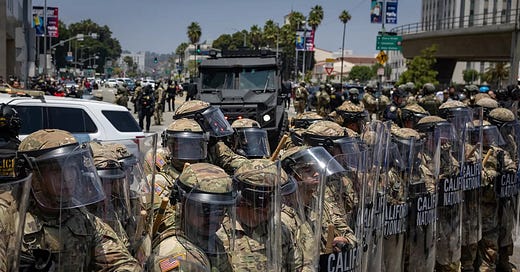It’s hard to put into words the heartbreak I felt when I saw the images of American active-duty troops patrolling the streets of Los Angeles. Not for a foreign humanitarian crisis, not to provide flood relief or wildfire evacuation support, but for domestic law enforcement.
Let’s be clear: this is not who we are. And it’s not what our troops signed up to do.
In the middle of the most complex and volatile international security environment in decades—where the Middle East is on the brink, where China is consolidating authoritarian influence and Russia is invading its neighbors, and where Iran is enriching uranium to near-weapons-grade levels—we are turning our eyes inward, choosing to send battle-hardened soldiers to confront American citizens.
This isn't just morally troubling; it's strategically disastrous.
What message is President Trump sending to the world when he redirects our most powerful symbol of global leadership—the U.S. military—from deterring our adversaries abroad to intimidating our own people at home?
Let’s not kid ourselves. The real foreign threats haven’t disappeared. Iran continues to destabilize the Middle East through its proxies. Russia, led by an increasingly emboldened Vladimir Putin, is doubling down on its war of choice in Ukraine. And China’s diplomatic charm offensive belies its aggressive moves across the Indo-Pacific. These are not abstract fears—they are real, persistent, and growing.
Yet here we are, sidetracked, with American authoritarianism on our own streets.
I’ve spent my career — from the State Department to Capitol Hill — working on foreign threats, and I can tell you this with certainty: deploying troops against our own people does not make us stronger. It makes us weaker. It tells our enemies that we are fractured, that our national focus is blurred, and that we are distracted from doing what America has long done best — lead.
Moreover, let’s consider the chilling precedent being set. Turning the U.S. military into a domestic policing tool erodes the sacred civilian-military divide. Our service members swear an oath to defend the Constitution against all enemies, foreign and domestic—not to act as a domestic security force deployed at the whim of political goals.
The National Guard exists for state support during crises. Local police, though far from perfect, are trained for community engagement. But the U.S. military? That’s a tool of last resort, one meant for war zones—not Wilshire Boulevard.
I understand the frustration and fear that policymakers might be feeling in the face of civil unrest or rising public tension about Trump’s immigration deportation policy. And I fully reject the hooliganism of a small group of anarchists and violent actors. But leadership in these moments means calling for dialogue and understanding, ratcheting down the pressure, not bringing in military vehicles and camouflaged soldiers. If history teaches us anything, it’s that once we normalize the use of troops in our cities, it becomes that much easier to justify it again—and again.
The threats we face abroad are already daunting. Let’s not manufacture new ones at home. Let's not do the work of our adversaries for them by turning our troops into instruments of fear instead of agents of freedom.
Our enemies are smiling.
America must be better than this. We must believe in our democracy enough to trust our civilian institutions. We must believe in our people enough to solve problems through engagement, not intimidation.
Our troops should be protecting us from the real national security threats. And those threats are not walking the streets of Los Angeles—they are watching from Tehran, Moscow, and Beijing.
Let’s keep them focused on where they are needed most.





